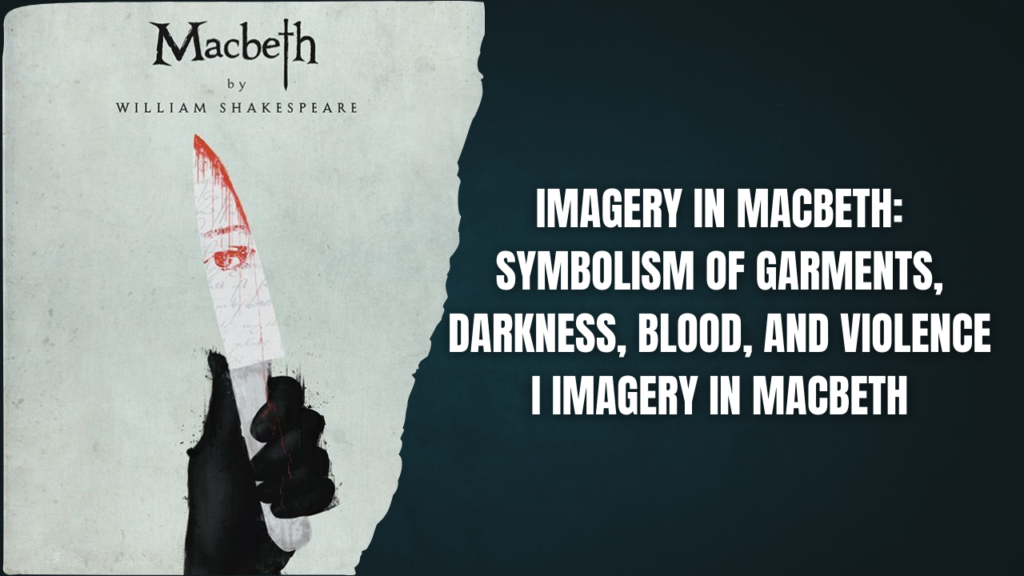Examine Macbeth as a tragic hero with special reference to tragic flaw in him.
OR
“The destruction of Macbeth reflects the fall of Satan himself.” Discuss.
OR
“Macbeth the man is a study in self damnation.” Discuss.
OR
Show the stages by which Macbeth degenerates from a hero to villain.
Ans.
Introduction
Macbeth is a tragic play by William Shakespeare which was performed in the year 1606. The play highlights the devastation that occurs due to excessive desire for power. Of all the plays performed by Shakespeare during his reign of King James, who was a patron of Shakespeare’s acting company, Macbeth suits his sovereign. It was first published in the Folio of 1623, possibly from a quarto book and is Shakespeare’s shortest tragedy.
Ambition as the tragic flaw
It is certain that Macbeth is a tragic hero and the tragic flaw which leads to his downfall is ambition. He possesses all the splendour and magnificence which is possessed by his tragic character. He has excessive ambition, and an excessive desire to obtain kingship which was prophesied to him. This reflects that he was secretly cherishing this desire in his heart. Macbeth can be compared to Satan of Hell. Satan also was responsible for his downfall due to his ambition and pride. He desired to obtain the throne of Almighty, and Macbeth wished to obtain the throne of Scotland. This one aspect of ambition led to both fall and tragedy of Macbeth. The ambitious man always tries to rise above the limits set by Almighty and this leads to breakage of bond with the omnipotent.
Prophecy and Macbeth’s response
Macbeth defeated the rebels from Ireland and Norway and obtained the generosity of King Duncan. The prophecies of the witches had an effect over Macbeth. It is because on hearing the prophecy that he will be king gave him a start. The thought of kingship engrosses him deeply. In an aside, he clearly reveals the means which will help him in attaining that position and power. In his soliloquy he speaks of “a horrid image” which makes his hair stand on end and which makes his firm heart knock at his ribs. But Macbeth tries to dismiss the thought of assassination and says that if he is destined to become king he would attain that position without any effort on his part. He initially tries to suppress the evil thoughts that occurred to him.

Macbeth as a noble character
In order to qualify as a tragic character, the protagonist should neither be too good nor too bad. He should be a character having a flaw or hubris that is the main cause of his downfall. The manner in which Macbeth is greeted by Duncan and thanked for the services he has rendered to the crown confirms our impression that Macbeth is a man of great qualities. However, when Duncan has announced the nomination of Malcolm as the heir to the throne, Macbeth, in an aside, reveals his ambition still at work in his mind.
In his soliloquy he realizes the difficulty that has unexpectedly arisen in his way of success, the difficulty being the promotion of Malcolm. Similarly, with the realization of this difficulty, the only means to obtain kingship that occurs in the mind of Macbeth is the assassination of King Duncan.
Change of fortune or peripeteia
In the tragedy of a person, the tragic her undergoes a change of fortune. It changes from good to that of bad. Macbeth’s journey of being a tragic hero, includes him changing from a great soldier to that of a tyrant. Finally, he meets his death at the hand of another humble character, Macduff.
When Macbeth returns to his castle at Inverness, his wife Lady Macbeth too speaks cruelly about the means of obtaining monarchy. She also suggests him the assassination of King Duncan to which Macbeth shows an inconsistent attitude of “we will proceed no further in this business.” This decision of Macbeth frustrates Lady Macbeth, and she taunts Macbeth for being a coward in this venture. Her instigation works as a step to self-damnation.

The murder of King Duncan is the fourth and most vicious step towards Macbeth’s self-damnation. By murdering generous King Duncan, Macbeth strangles his conscience. But the conscience becomes silent when the murder has been committed. Macbeth’s inability to utter the word “Amen” at the end of the brief prayer that two other men have offered; he was hearing the voice asking him to sleep no more because he had already murdered sleep. These are the signs of the keen sense of guilt which makes Macbeth unhappy at this time.
After the murder of Banquo that was planned by Macbeth, he faces trouble when the ghost of Banquo enters the banquet hall. All the Scottish nobles present in the banquet got surprised at the behaviour of Macbeth. Lady Macbeth somehow tries to manage the troublesome situation.
In his soliloquy Macbeth now consciously and on his own interests wishes to accelerate his damnation. This act of Macbeth represents the confirmation of his downfall. By meeting with the witches, he puts an implicit trust on them. His last act of murdering Macduff’s family, an act which was his slaughter of innocent souls, shows Macbeth is now a ruthless and unscrupulous criminal. He becomes a most despotic and tyrannical king and people of Scotland witness a reign of terror.
Finally, Macbeth’s life ends at the hands of Macduff who was not born of a woman in the normal sense. Macduff shows his conscience and he never sacrifices his conscience for the sake of benefit as Macbeth. He slays the tyrant and takes the responsibility of bringing in back the rightful heir, Malcolm as the next heir to the throne.
Anagnorisis
Macbeth thought no man “of woman born” could harm him. But when Macduff declares he was “from his mother’s womb untimely ripped” (born by caesarean), Macbeth suddenly understands the prophecy’s real meaning. This is a direct moment of tragic recognition. Before the final battle, Macbeth reflects that despite achieving kingship, he has no honor, love, or loyalty:
“That which should accompany old age,
As honour, love, obedience, troops of friends,
I must not look to have…”
This shows his realization that his ambition has left him spiritually bankrupt.
Conclusion
As a tragic hero, Macbeth’s downfall occurs due to his hubris of vaulting ambition. His vaulting ambition was unchecked that made him crossed the boundaries of being a human. The greediness succumbed him to murder King Duncan; his good friend, Banquo and the whole family of Macduff. The deceptive nature of the prophecies made him realize that he lost the battle of ambition because it was a wrong type of want that was characterize by greediness and excess desires. This kind of ambition surpasses conscience and reality check. Finally, he loses everything instead of gaining due to ambition and he meets his tyrannic death which shows the restoration of order.


